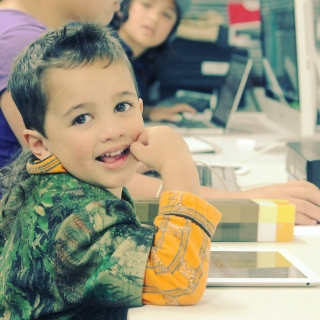FEATURED STORIES
Case Studies & Initiative Journeys
Case Studies described here are real examples of how an organisation has used an approach in Aotearoa New Zealand. Contact the featured organisation if you want to find out more. Please contact us to find out if there is a case study you think might be good to profile on this site.
Inspiring Curious Minds – Teaching Māori Kids to Code
Evaluative Approach
Surveys
Organisation
Digital Natives Academy
Location
Rotorua

Contact Information
Digital Natives Academy
Overview
Digital Natives Academy (DNA) is a non-profit that exposes Māori tamariki and rangatahi to science, technology, engineering and maths (STEM).
DNA received funding from New Zealand Qualifications Authority (NZQA) to hold workshops for rangatahi Māori, to teach them robotics and coding. DNA wanted to measure the workshops’ effectiveness.

They designed the workshops to find out whether they could enthuse Māori students so much that they’d consider careers in STEM. They were also promoting STEM to students and their whānau.
Forty five Māori students from a mix of educational institutes (Kura, Highschool, Homeschool) from around the country took part.
How they used surveys
Evaluations were done using online surveys. Each student submitted their response to a survey before the workshop started. At the end of each workshop, DNA surveyed students again to learn whether their views about STEM had changed. They also tried to find out if the children were keen to learn more.
Responses suggested a high level of enjoyment. Ninety-six percent of students enjoyed DNA’s workshops and 100% said DNA tutors had inspired them to learn more.
To understand better how students connected with the STEM experience, DNA asked them if they’d been challenged to learn something new and if they wanted to visit DNA again.
Ninety one per cent of students felt DNA tutors had challenged them to learn something new while 89% of students wanted to visit DNA again.
This data suggests they became so involved that they wanted to discover and explore STEM-related subjects.
“Asking the right questions is critical otherwise you end up collecting the wrong data. These responses tell us that an overwhelming majority of our students wanted to continue their journey,” says Potaua Biasiny-Tule, DNA founder and mentor.
DNA asked quantitative and open ended questions so students could voice their opinions. The following highlights their theme:
“Kai pai it was an amazing experience for me. It showed me that science isn’t all boring, but does require having fun while you learn. I learnt not only how to make robots but how to understand the way our future mahi will affect lives of Aotearoa.“
“This was an educational fun cooperative day and I’d like to thank you for the efforts you put in to make this day super awesome! Kia ora!”
Results from both pre and post workshop surveys were then compared and examined.
Before the workshops, less than 50% of attendees said they weren’t interested in working in STEM-related industries. After the workshops, a significant shift in interest happened with 78% considering work in a STEM related industry.

Lessons learnt about surveys
Using surveys was a great option for us, young people are digital natives now by birth, so filling out online forms is simple and easy for them,” Potaua says.
NZQA’s decision to look at innovative ways to raise Māori achievement in STEM subjects was imaginative and pro-active. That’s why DNA wanted to measure what it achieved.
Wanting to inspire Māori students to become makers of technology instead of just consumers is DNA’s main goal. Using surveys to measure success was incredibly helpful.
